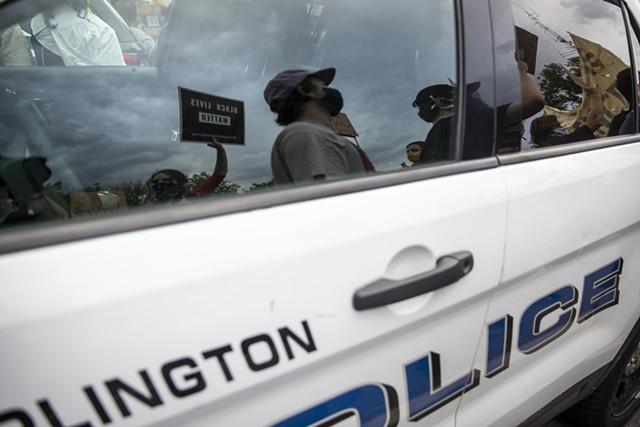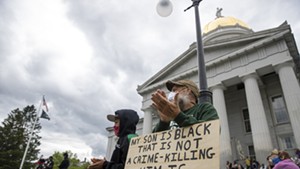Vermont lawmakers are fast-tracking some straightforward police reform measures but plan to take more time with potentially controversial changes, such when police officers are justified in using deadly force.
The dual tracks reflect the pressure lawmakers feel to act both quickly and deliberately as they participate in the painful debate about racism and police brutality that has convulsed the nation since the death of George Floyd.
Floyd, an unarmed Black man, was killed last month in Minneapolis when a white police officer pressed his knee on his neck for 8 minutes and 46 seconds.
After taking testimony for two weeks, the Senate Judiciary Committee on Friday divided a police reform bill into two parts in an effort to ensure the reforms in
S. 219 — including assurances that police collect and report race data — can be passed by both chambers of the General Assembly by the end of this month.
The committee moved provisions dealing with police use of deadly force into a separate bill,
S. 119, because House members wanted more time to take up the complex measure after the August break, Sen. Dick Sears (D-Bennington) told his colleagues Friday.
Both bills passed out of the Judiciary Committee on Friday, which Sears noted was “appropriate” given the Juneteenth holiday celebrating the end of slavery in the U.S.
“Hopefully they will make a difference,” Sears said of the two bills.
The first bill simply requires that in order for law enforcement organizations to receive state grants, they must show that they have complied with existing laws requiring the collection of race data in police interactions with the public.
Police agencies already must gather information on the age, race and gender of drivers, as well as the reason for and outcome of traffic stops. The bill would require additional reporting of whether police threatened or used physical force, whether any injury resulted, and whether a "prohibited restraint" was used.
“The goal of this section is a ban on chokeholds,” Sears said Friday.
The bill defines such restraints as “any maneuver on a person that applies pressure to the neck, throat, windpipe, or carotid artery that may prevent or hinder breathing, reduce intake of air, or impede the flow of blood or oxygen to the brain.”
The committee removed references in the draft to “spine” and “torso” after Minority Leader Joe Benning (R-Caledonia) said there might be times when an officer legitimately needs to sit on a suspect who is “flipping out” and endangering others.
The bill also defines an officer's failure to intervene when another officer uses excessive force as unprofessional conduct.
The bill would require the Department of Public Safety to ensure that all state police have body cameras, and to submit a budget for such purchases to lawmakers by August. The bill would go into effect August 1.
The sections regarding the use of deadly force were moved to a separate bill that would go into effect October 1.
S.119 deals with “law enforcement training on appropriate use of force, de-escalation tactics, and cross-cultural awareness.”
The bill would establish a statewide policy that clarifies that the use of physical force “is a serious responsibility that shall be exercised judiciously and with respect for human rights and dignity and for the sanctity of every human life.”
Officers can use deadly force “only when necessary in defense of human life,” and “shall be evaluated” by others “based on the totality of the circumstances known to or perceived by the officer at the time.” The bill stresses that officers could use “proportional force if necessary to effect the arrest, to prevent escape, or to overcome resistance” of a suspect.
On this point, Sears invoked Floyd's killing. “We had a person who is alleged to have passed a $20 bill in a store in Minneapolis and the whole arrest, restraint, everything results in that man’s death," Sears said. "Is that proportional to the crime?”
The full Senate is expected to take the bills up next week.













Comments
Comments are closed.
From 2014-2020, Seven Days allowed readers to comment on all stories posted on our website. While we've appreciated the suggestions and insights, right now Seven Days is prioritizing our core mission — producing high-quality, responsible local journalism — over moderating online debates between readers.
To criticize, correct or praise our reporting, please send us a letter to the editor or send us a tip. We’ll check it out and report the results.
Online comments may return when we have better tech tools for managing them. Thanks for reading.